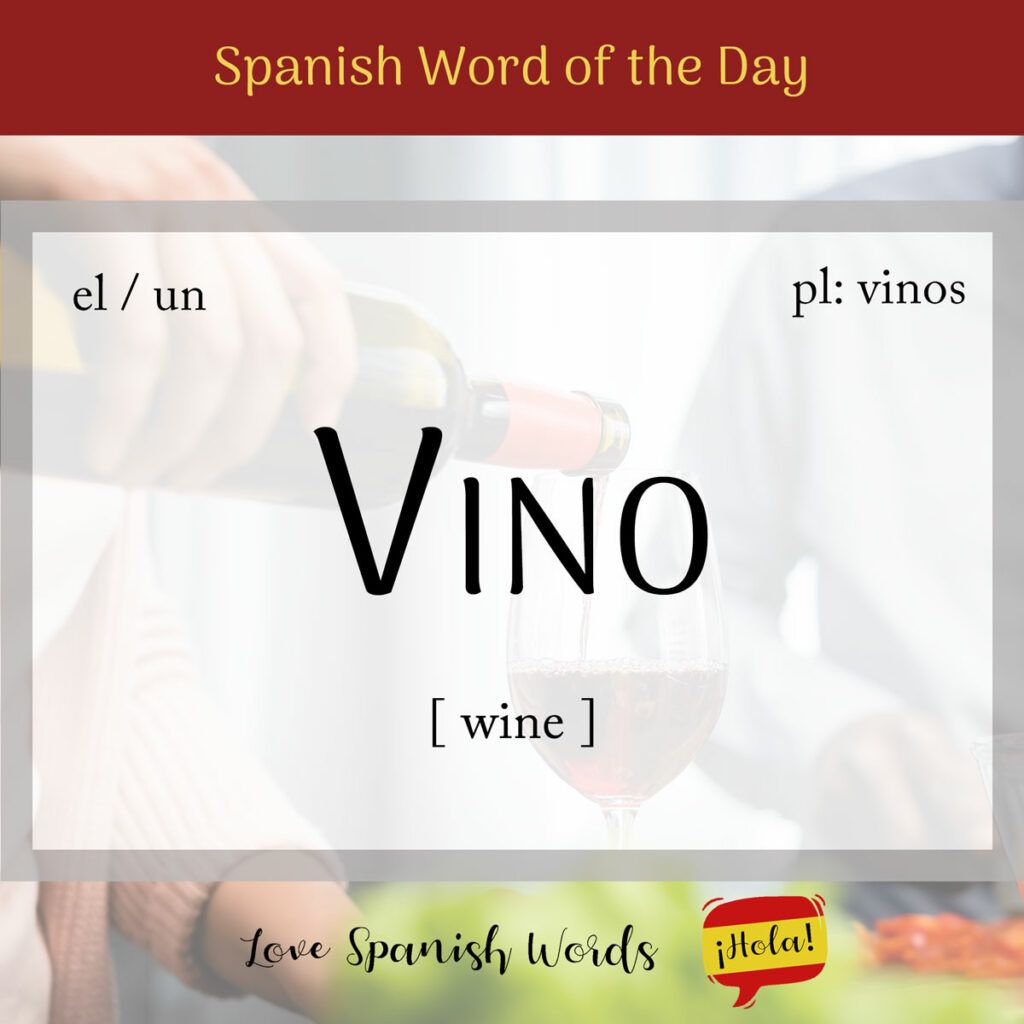Spanish-speaking countries are famous worldwide for the extent and quality of their wines. Wine is a huge part of Spanish culture and can be drunk at almost any time of the day.
Typically wines produced in Europe are called old world wines and those produced in Latin America are called new world wines. Vinos de Rioja or Ribera del Duero are the name given to two excellent Spanish wine regions. Cabernet Sauvignon and Merlot are types of grape but also the name of wines made in Chile. In Argentina, they mostly make Malbec, Chardonnay, and Pinot.
Latin American Pronunciation
European Pronunciation

The word vino comes from latin vīnum, the same origin as wine.
Yo siempre bebo un vaso de vino con la cena.
I always have a glass of wine with dinner.
Vino is a masculine noun that takes the following definite and indefinite articles:
- el vino = the wine
- los vinos = the wines
- un vino = a wine
- unos vinos = some wines
Mi vino favorito es el vino blanco de Albariño.
My favourite wine is the white wine from Albariño.
When you go for a meal to a restaurant, you may be offered el vino de la casa (the house wine, literally meaning the wine of the house). In the olden days, this was wine made by the owners, cheap and not of great quality. Nowadays the term is still in use but just to describe the cheapest wine in the restaurant with no clear origin.
Por favor, tráigame el vino de la casa.
Please, bring me the house wine.
When you go to the shops you may find vino de mesa (table wine or “wine of table”). This is a way of referring to a cheap wine, not taking into account its origin either.
Este vino de mesa no está mal.
This table wine is not bad.
But enough of cheap wines! If what you want is a good wine and the price is not the priority, you may want to go for vino de crianza which has spent a minimum of one year in casks and a few months in the bottle.
Or even better, vino de reserva (reserve wine) are Spanish wines that have been curated for at least three years and one of them in an oak barrel. And if you are really pushing the boat out, go for a vino gran reserva aged for at least five years with a minimum of two years in oak.

Vino is also the past tense for the third person of venir (to come).
- él vino = he came
- ella vino = she came
Don’t get confused!
Ella vino al bar a beber un vaso de vino.
She came to the bar to drink a glass of wine.
Beyond the regions where the wine is produced or the type of grape used, there are many ways to describe wines:
- vino tinto = red wine
- vino blanco = white wine
- vino rosado = rose wine
- vino dulce = sweet wine
- vino seco = dry wine
- vino espumoso = sparkling wine
- vino generoso = fortified wine
- vino joven = young wine

A traditional wine in Portugal is the vino verde which means green wine.
Despite its name, vino verde can be red, white, or rosé. The name comes from the fact that it is made from very young grapes, which is why it’s referred to as “green” (meaning not fully ripe).
There are also a number of important drinks made with red wine, including Sangría. Its fruity flavour blends red wine, chopped fruits, sweetener and a splash of brandy or Cointreau orange liqueur. Tinto de Verano is an incredibly refreshing summer drink of red wine and lemonade. Finally, Calimocho (Kalimotxo in the Basque country) is a go to, a popular Spanish party drink made with equal amounts of red wine and cola served over ice.
If you see a sign saying bodega, you can bet that you will find a great stock of wines that the owner will be able to tell you all about. Its common to come with your own container and fill up directly from the barrel. It is often the cheapest way of getting some genuinely good wines.

Spanish idioms featuring ‘vino’
Olor a bodega
Literal translation: smell of winery.
English meaning: An expression used to refer to faulty wine which smells unclean.
Al pan, pan, y al vino, vino
Literal translation: to bread, bread, and to wine, wine.
English meaning: A request to be direct. Using this phrase means you want someone else to call it like it is.

